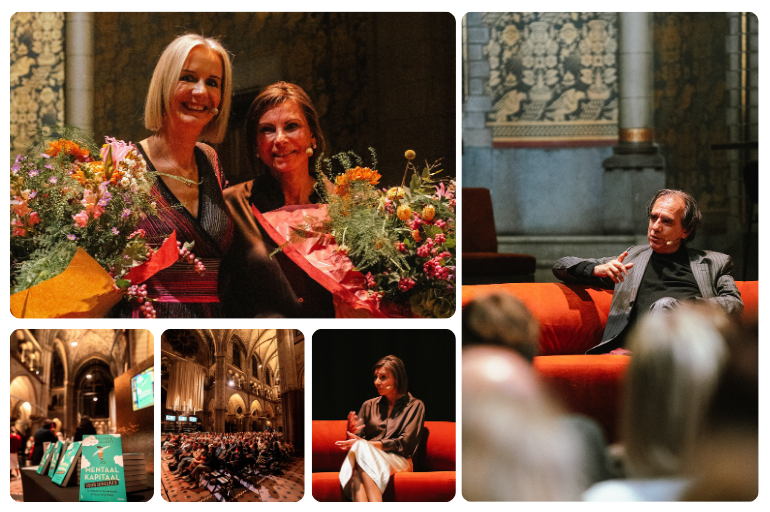The younger generation holds up a mirror to leaders

The mental capital of young people is a wake-up call for organisations
On 29 September we hosted the book launch of "Mentaal Kapitaal Voor Jongeren", the new publication by Marie Loop and Elke Geraerts, written in Dutch. During the event they engaged in a dynamic conversation with leading experts Dirk De Wachter and Theo Compernolle about the challenges young people face today, from digital pressure to a growing sense of loneliness. The insights shared that evening reach far beyond the world of youth. They also hold up a mirror to leaders and organisations.
Twenty five years. That is how much time a young person will spend scrolling by the end of their life. A number that fascinates and worries at the same time. Behind that statistic lies a generation that longs for direction, connection and calm in a world that constantly stimulates them. And this is exactly where a mirror appears for leaders and organisations. What young people experience today says a great deal about what working people of all ages need to stay mentally resilient.
The generation growing up with a crumbling brain
Neuropsychiatrist Theo Compernolle already warned years ago about the crumbling brain, a brain so frequently interrupted by notifications, deadlines and digital distractions that it loses its ability to focus deeply.
We see the same pattern inside organisations. Teams rush from meeting to meeting, employees scatter their attention across emails, chat messages and endless to do lists. The cognitive overload that young people face in their digital world is reflected in our work culture.
The challenge for leaders is to create a work environment that is friendly to the brain, where there is space for concentration, recovery time and genuine human attention. Anyone who wants young employees to use their full mental capital must first learn to protect their own.
The paradox of connection
Psychiatrist Dirk De Wachter describes it well. We live in a culture centred on the autonomous self. While technology gives us the illusion of being connected, loneliness is never far away. Young people feel it in their online bubbles and employees recognise it too. Busy in their tasks, yet rarely truly connected.
Organisations wanting to connect with younger generations need to reinvest in real presence. That begins with leadership that dares to slow down, listen and create space for what is unfinished. For conversations between colleagues and for the imperfections that make us human.
As De Wachter puts it, the difficulties and annoyances of life create connection. The same is true in the workplace. It is the small stumbles and honest admissions that things are hard that draw teams closer together.
From performance pressure to purpose pressure
Young people grow up in a world of algorithms and likes. What they show seems almost more important than who they are. That drive for perfection pushes many toward stress and insecurity. The parallel with the workplace is clear.
In many organisations success is still measured mainly in visible achievements such as targets, KPIs and productivity. The younger generation is asking for something else. They seek purpose pressure rather than performance pressure, a context in which they feel their contribution truly matters and is not only measurable.
What leaders can learn from the new generation
What young people need, things like focus, genuine connection, room to learn through trial and error and a sense of purpose, are the very things that make organisations stronger. And that calls for leaders who:
• Dare to set digital boundaries. Not every ping deserves attention.
• Choose connection over perfection. Real conversations matter more than polished slides.
• Normalise recovery. Rest is not a luxury but a strategic resource.
• Put meaning at the centre. Gen Z especially wants to understand why their work matters.
A future in which mental capital grows
If there is one lesson this generation teaches us, it is this. Mental capital needs ongoing care. And that care starts with leaders who look beyond numbers and see the human being behind the employee.
Young people show us not only where things falter, but also how things can improve. Their search for balance, attention and connection is not a sign of fragility. It is an invitation to build a more human work culture for the future.
Want to learn more about the mental capital of young people?
Discover the new book by Marie Loop and Elke Geraerts, filled with scientific insights and practical tools to strengthen the mental resilience of young people.
Ready to future-proof your organisation for Gen Z?
High potentials are the heartbeat and future of your organisation. What if you could not only challenge these talents but also support them in building their mental strength? Our keynote, designed specifically for young employees, invites them to take a fresh look at themselves.
Through scientific insights and relatable examples we translate complex themes such as stress, loss of focus and the importance of self-care into concrete everyday tools. Want everyone facing in the same growth direction right away?
Then this inspiring keynote is exactly what your organisation needs. It encourages action and contributes to sustainable development, personally and professionally.

Source: Book launch “Mentaal Kapitaal Voor Jongeren”.





